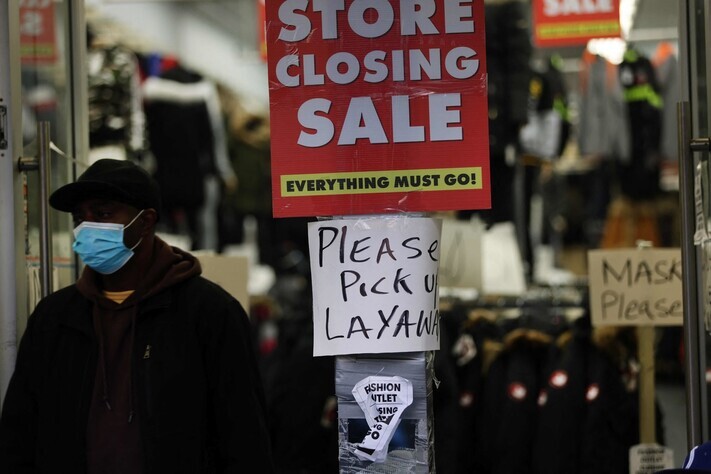hankyoreh
Links to other country sites 다른 나라 사이트 링크
[Book review] How do we salvage American capitalism?


A Korean translation is now available for "People, Power, and Profits," the book by Columbia University Professor Joseph Stiglitz that criticizes the American model of capitalism and explores alternatives. Stiglitz, a Nobel Prize-winning economist, has long been a student of the subjects of inequality and globalization.
In the acknowledgments section, Stiglitz explains that his latest book ties together the ideas he has examined in his various articles and books about globalization, inequality, the true source of economic growth, economic policy, and finance.
First, Stiglitz states that the economic problems facing the US are a slowdown in economic growth and the worsening of inequality. From 1947 to 1980, the US's yearly average growth rate was 3.7%. From 1980 to 2017, however, this rate fell to just 2.7%. Moreover, the fruits of this diminished growth went to the country's minority elite. The amount American workers gained from economic growth fell from 75% in 1980 to 60% in 2010. On the other hand, the country's top 10%, 1%, and 0.1% are gradually taking more and more from the overall pie. America's wealth inequality is a more serious issue than income inequality. The top 1% of the population holds more than 40% of the country's wealth. If you were to combine the wealth of the three richest people in the US - Amazon founder and CEO Jeff Bezos, Microsoft founder Bill Gates, and Berkshire Hathaway CEO Warren Buffet – that amount would be more than all of the wealth held by half of the lowest-earning Americans.
One of the major reasons for this "failure" is the increasing domination companies have over their markets. Each market is witnessing a diminishing number of competitors, leaving only a few companies to soak up all the sales. According to Stiglitz, companies that dominate their market exploit consumers by imposing higher prices for their products and usurping consumers' interests. He says that domination over a particular market allows the direct exploitation of workers by permitting companies to lower wages and use their workforce in a myriad of ways. In short, companies are not "creating" wealth in any real way; instead, they are taking wealth away from other people. The reason more and more companies are dominating their markets is because existing companies are raising the barriers to entry, which effectively prevents new competitors from emerging. Companies are neutralizing competition by abusing the patent system and taking over newly-formed companies. The increase in market monopolies, failures to properly respond to globalization, and the unrestrained financial market have all played a part in the US's economic failure. Moreover, artificial intelligence, big data and other new forms of technology risk making these trends even worse.
What is needed to stop these trends in their tracks, promote economic growth, and decrease inequality? Stiglitz argues that the government must take on a much larger role than in the past. He argues that "market fundamentalism" (or neoliberalism) is no longer valid. Stiglitz even presents specific policy items that the government should implement, including public investment in social infrastructure and basic research, proactive labor market policies, a search for new industrial policies and support to SMEs, the expansion of social protections such as unemployment insurance, and the provision of high-quality and free public education.
What Stiglitz particularly emphasizes here is the government role in employment. According to him, the most important policy to ensure "equality, growth, and efficiency" is to maintain full employment of the population. The government, in short, should work hard to implement currency and financial policies that ensure everyone stays employed. What if, however, full employment cannot be achieved through the market? Stiglitz has a plan for that: The government must hire people itself. He argues that 21st century America must accept that all people who have the will and ability to work should have the opportunity to do so.
Because markets do not ensure "social justice" and "opportunities" for people, the government must actively facilitate the distribution (pre-dispersion) and redistribution of wealth. Government leaders must take pains to make sure that the distribution of market earnings is done as equally as possible. The state must also prevent companies from achieving monopolies, stop discrimination against vulnerable populations, ensure that CEOs are not given excessively high salaries, reform corporate governance structures, pass better labor laws, and increase the minimum wage. Despite such efforts, it will be difficult for governments to completely end market earnings inequality. That is why government leaders need to take on further redistribution efforts through more powerful progressive tax and transfer tax programs, along with public expenditure programs, to ensure that everyone's livelihoods are maintained at equal levels.
A tax system is important to ensure the creation of a dynamic and fair society, along with ensuring the government has enough funds on hand to do what it needs to do. There is no question that governments need to tax companies and wealthy people properly. Going a step further, however, Stiglitz argues that people who have earned income from real estate must be taxed at higher rates. This is because, in his view, the increase in the tax rate on capital interests and land will make it possible for even more savings to become "productive capital."
Stiglitz argues that now is the time to create a new "social contract in the 21st century" to make the American Dream a reality. He says that markets are built by people and that Americans have remade markets over the past 40 years in a way that slows economic growth and worsens inequality. He says that Americans have "chosen" a model of economic growth that is not helpful to the majority of the population. Stiglitz argues that the rules must be rewritten to enable the economy to work more effectively for society. In short, he emphasizes that remaking these rules is up to the country's politics.
Because this book came out in 2019, it fails to touch on the major changes that happened soon after. Stiglitz criticizes the Trump administration quite a bit, and the book does not deal with economic policy changes that have occurred due to the COVID-19 pandemic. Readers must also remember that the book was written with a focus on the situation in the US. The book, nonetheless, is worth reading because of the alternative ideas and policies presented by a great scholar, particularly given the massive influence American-style capitalism and market fundamentalism has on Korean society.
By Ahn Seon-hee, staff reporter
Please direct comments or questions to [english@hani.co.kr]

Editorial・opinion
![[Editorial] Does Yoon think the Korean public is wrong? [Editorial] Does Yoon think the Korean public is wrong?](https://flexible.img.hani.co.kr/flexible/normal/500/300/imgdb/original/2024/0417/8517133419684774.jpg) [Editorial] Does Yoon think the Korean public is wrong?
[Editorial] Does Yoon think the Korean public is wrong?![[Editorial] As it bolsters its alliance with US, Japan must be accountable for past [Editorial] As it bolsters its alliance with US, Japan must be accountable for past](https://flexible.img.hani.co.kr/flexible/normal/500/300/imgdb/original/2024/0417/6817133413968321.jpg) [Editorial] As it bolsters its alliance with US, Japan must be accountable for past
[Editorial] As it bolsters its alliance with US, Japan must be accountable for past- [Guest essay] Amending the Constitution is Yoon’s key to leaving office in public’s good graces
- [Editorial] 10 years on, lessons of Sewol tragedy must never be forgotten
- [Column] A death blow to Korea’s prosecutor politics
- [Correspondent’s column] The US and the end of Japanese pacifism
- [Guest essay] How Korea turned its trainee doctors into monsters
- [Guest essay] As someone who helped forge Seoul-Moscow ties, their status today troubles me
- [Editorial] Koreans sent a loud and clear message to Yoon
- [Column] In Korea’s midterm elections, it’s time for accountability
Most viewed articles
- 1[Column] The clock is ticking for Korea’s first lady
- 2Samsung barricades office as unionized workers strike for better conditions
- 3[Editorial] When the choice is kids or career, Korea will never overcome birth rate woes
- 4[News analysis] After elections, prosecutorial reform will likely make legislative agenda
- 5S. Korea, Japan reaffirm commitment to strengthening trilateral ties with US
- 6Japan officially says compensation of Korean forced laborers isn’t its responsibility
- 7Why Israel isn’t hitting Iran with immediate retaliation
- 8[Editorial] Does Yoon think the Korean public is wrong?
- 9[Guest essay] How Korea turned its trainee doctors into monsters
- 10[Editorial] As it bolsters its alliance with US, Japan must be accountable for past